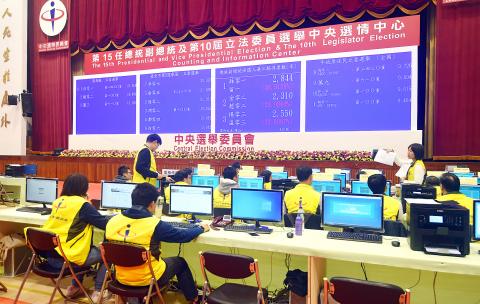To ensure that today’s presidential and legislative elections proceed in an orderly fashion, people may not canvass for votes for any political party or candidate, including on social media, the Central Election Commission (CEC) reiterated yesterday, adding that offenders would face a fine.
Article 56-2 of the Civil Servants Election and Recall Act (公職人員選舉罷免法) prohibits people on election day from canvassing for votes, distributing election-related flyers, sending text messages, putting up posters, raising flags that bear candidates’ slogans or portraits, broadcasting from campaign vehicles or loitering near polling stations in clothing bearing candidates’ names, the commission said.
Offenders would be reported by polling station supervisors to the commission’s board of supervisors and would face a fine of NT$500,000 to NT$5 million (US$16,656 to US$166,561), with repeat fines possible if offenders refuse to comply, the commission said.

Photo: Liao Chen-huei, Taipei Times
If people hand out water or other beverages to voters on behalf of a candidate or party, they would be stopped by polling supervisors, the commission added.
If people interfere with the voting by becoming violent or attempting to coerce others, polling supervisors would inform the commission to contact the police or a prosecutors’ office, it said.
On election day in 2012, the “Taiwan Cheers, Great!” Facebook page, set up by then-president Ma Ying-jeou’s (馬英九) re-election campaign office, posted a message urging people to vote for Ma, resulting in a NT$500,000 fine from the commission.
Today at the polls, voters are to receive three ballots — a presidential ballot, a regional or Aboriginal legislator ballot and a ballot for a political party, which would determine the legislator-at-large seats.
According to the commission, more than 19.31 million people are eligible to vote today.
A two-month difference in voting residency requirements allows 19,311,105 people to cast their ballots for president, while 1,000 more can do so for the legislator-at-large seats, the commission said.
The election laws stipulate that Republic of China citizens must at some point have resided in Taiwan for a minimum of six consecutive months to be eligible to vote for president, or four months to vote for other civil servants.
Of the nation’s eligible voters, 13.37 million (69 percent) are registered in the six special municipalities: Taipei, New Taipei City, Taoyuan, Taichung, Tainan and Kaohsiung, the commission said.
People aged 40 to 49 make up the largest voting bloc with 3.74 million eligible voters (19 percent), followed by those aged 50 to 59 with 3.63 million, it said.
About 1.18 million 20 to 23-year-olds (6 percent) are eligible to vote in the presidential and legislative elections for the first time, it added.
After the polling stations close at 4pm today, votes for president are to be tallied first, followed by regional/Aboriginal legislator votes, with political party ballots counted last, the commission said.

South Korean K-pop girl group Blackpink are to make Kaohsiung the first stop on their Asia tour when they perform at Kaohsiung National Stadium on Oct. 18 and 19, the event organizer said yesterday. The upcoming performances will also make Blackpink the first girl group ever to perform twice at the stadium. It will be the group’s third visit to Taiwan to stage a concert. The last time Blackpink held a concert in the city was in March 2023. Their first concert in Taiwan was on March 3, 2019, at NTSU Arena (Linkou Arena). The group’s 2022-2023 “Born Pink” tour set a

CPBL players, cheerleaders and officials pose at a news conference in Taipei yesterday announcing the upcoming All-Star Game. This year’s CPBL All-Star Weekend is to be held at the Taipei Dome on July 19 and 20.

The Taiwan High Court yesterday upheld a lower court’s decision that ruled in favor of former president Tsai Ing-wen (蔡英文) regarding the legitimacy of her doctoral degree. The issue surrounding Tsai’s academic credentials was raised by former political talk show host Dennis Peng (彭文正) in a Facebook post in June 2019, when Tsai was seeking re-election. Peng has repeatedly accused Tsai of never completing her doctoral dissertation to get a doctoral degree in law from the London School of Economics and Political Science (LSE) in 1984. He subsequently filed a declaratory action charging that

The Hualien Branch of the High Court today sentenced the main suspect in the 2021 fatal derailment of the Taroko Express to 12 years and six months in jail in the second trial of the suspect for his role in Taiwan’s deadliest train crash. Lee Yi-hsiang (李義祥), the driver of a crane truck that fell onto the tracks and which the the Taiwan Railways Administration's (TRA) train crashed into in an accident that killed 49 people and injured 200, was sentenced to seven years and 10 months in the first trial by the Hualien District Court in 2022. Hoa Van Hao, a